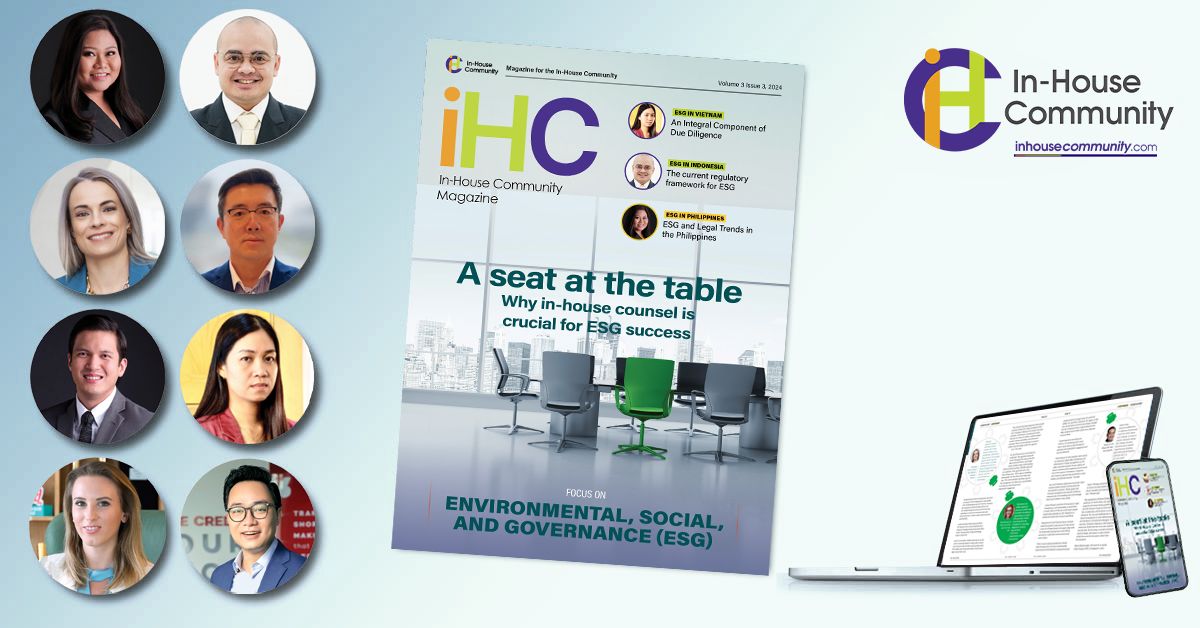June 27, 2024
IHC talks to Tianfu Liu, Vice President and Chief Counsel, Asia Pacific for Cabot Corporation, about his journey from private practice to glssobal legal strategist Could you share a little about your journey in your career so far and how you ended up in your current role? We’re especially curious about your additional role in business development! I studied law at CUPL in Beijing, McGill in Montreal and Penn in Philly. Prior to Cabot, I was a private practitioner between 2003 and 2010, first and briefly with MoFo in its then newly established Shanghai office and later with Freshfields Bruckhaus Deringer. At Freshfields, my practice covered cross border mergers and acquisitions, securities and FDI, with a focus on advising multinational investors in the financial services and real estate sectors on their establishment or expansion in China. In 2010, I joined Cabot as its China GC. My role was subsequently expanded in 2015 to cover Asia Pacific, and in 2019 to provide legal oversight to Cabot’s global Reinforcement Materials Segment, its largest business division operating in Argentina, Brazil, Canada, China, Colombia, the Czech Republic, France, Indonesia, Italy, Japan, Mexico, the Netherlands and the U.S. Since the beginning of 2022, I took on the role of Vice President, Strategic Business Development, AP Region in addition to my legal responsibilities for the AP region. In my newest capacity, I execute the company’s strategic projects in the AP region and manage their full lifecycle from market research, prospects identification, target screening and initial engagement, to modelling and valuation, due diligence, signing and closing, and eventually integration. Could you provide our readers with an... June 27, 2024
Pedro Massena with Rahul Prakash Twenty years ago, if a CEO was asked to merge sustainability with their corporate strategy they would have assumed someone was trying to sabotage the business. Changing the focus away from profits was unthinkable. But in-house legal teams have proven critical for finding ways to make sure sustainability doesn’t need to bite into the bottom line. In the bustling and diverse Asia-Pacific region, Environmental, Social, and Governance (ESG) principles have rapidly reshaped how businesses operate. From the vibrant markets of Southeast Asia to the technological powerhouses of Japan, China and South Korea, companies are slowly learning how to navigate a complex yet rewarding path toward a more profitable – and sustainable – growth. This journey is not just about compliance; it’s about innovation, resilience and longterm prosperity. The Asia-Pacific is a dynamic mosaic of cultures and economies, where each company shares the same value of contributing in their own way to a larger, cohesive picture of sustainable development. Here, ESG isn’t just an acronym – it’s written into the business culture. Governments and businesses alike are crafting robust frameworks to combat climate change, enhance transparency into their supply chains and promote social equity. Take Singapore’s Green Plan 2030, for instance. It’s a bold roadmap aiming for carbon neutrality and sustainable living. Or consider China’s ambitious goal to achieve carbon neutrality by 2060, which is already driving a massive shift towards renewable energy and eco-friendly practices. The stakes are high, given that the planet’s ecosystem may just be at risk. But the rewards of ESG are even higher. Investors are increasingly drawn to companies with... June 27, 2024
Kristin Charisse C. Siao, Carlo Augustine A. Roman The global push toward Environmental, Social, and Governance (“ESG”) practices in businesses of all sizes has seen rapid growth in recent years, with the Philippines being no exception to this growing movement. More and more, industry leaders and model organisations across the local business landscape have placed increasing emphasis on non-financial metrics that address critical social and environmental issues, with an eye toward making sure that business practices and investments will continue to be sustainable not merely on the basis of the balance sheet, but also society as a whole. Truly, investors in both the Philippines and abroad have become keener toward focusing on not just mere economic growth, but inclusive, balanced, and sustainable growth that can be maintained in the longer term. With this in mind, legislators and regulators in the Philippines have slowly but surely adjusted to the growing call for ESG monitoring and enforcement. As such, it is slowly becoming impossible for businesses to ignore social and ethical considerations when running their day-to-day affairs in this jurisdiction. Sustainability Reporting Guidelines for Publicly Listed Companies Consistent with global ESG trends and the push toward greater transparency for non-financial and sustainability issues –particularly in the present economic climate which prioritises environmental and social impact of businesses more than ever – the Securities and Exchange Commission (“SEC”) published Memorandum Circular No. 4, Series of 2019, or the “Sustainability Guidelines for Publicly Listed Companies (“PLCs”)” (the “SEC Sustainability Guidelines”), in order to help PLCs assess and manage non-financial performance across economic, environmental, and social aspects of their organisation. The reporting guidelines aimed... June 11, 2024
Welcome to the latest edition of the IHC Magazine which is directly distributed to over 40,000 legal professionals including more than 17,000 in-house counsel in Asia and Middle East. In this edition of the IHC Magazine, we delve into a topic of increasing importance and relevance in the legal landscape: Environmental, Social, and Governance (ESG) criteria. As the world rapidly evolves, ESG considerations are becoming integral to business operations, risk management, and strategic planning, making it essential for legal professionals to stay informed and adept in these areas. Upcoming Events
Recent Past Events















